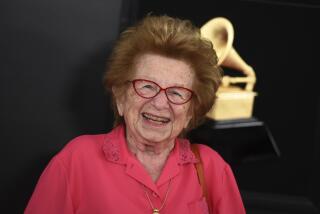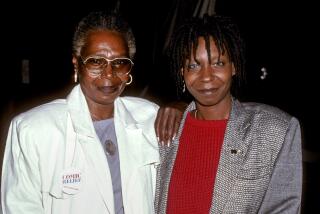Wrestling with the ‘Heidi’ effect
- Share via
PLAYWRIGHT Wendy Wasserstein’s death Monday, at 55, from lymphoma, saddened the theater community, surprised the public and deeply shocked women of a certain time and mind-set in ways we can’t quite get our minds around. Even for those of us whose knowledge of Wasserstein was limited to her most famous play, “The Heidi Chronicles” -- the award-winning work in which a respected art historian struggles to find her place in the world and eventually adopts a baby -- something about her passing feels bigger than the death of one person.
Like Heidi, Wendy Wasserstein found professional acclaim, remained unmarried and became a mother. Unlike Heidi, Wasserstein became pregnant at 48 through in-vitro fertilization, developed life-threatening complications and delivered at 27 weeks. Lucy Jane Wasserstein was born at 1 pound, 12 ounces. “Her face was smaller than an apple,” Wasserstein later wrote in an essay. “Her diaper was the size of a cigarette pack.”
I never met Wasserstein, and I know little about her daughter other than that she is now a healthy 6-year-old. But in the last week, I’ve felt both of them lingering like specters around the pens and papers and microwaved dinners that litter my home office.
Wasserstein was famous for speaking directly to the concerns of baby boomer women. But my generation, the one that followed, experienced the tenets of her ideas in a subtler and perhaps even more powerful way. We weren’t her target audience, but we absorbed her philosophy (though “philosophy” is the wrong word; it was more of a campaign for the acceptance of imperfection) as if it came from an IV drip administered (possibly with sinister intent) from the previous generation.
It was all about the alternating beauty and tyranny of options. We knew we could couple up or remain uncoupled, have babies or not. We knew we could mix and match these pursuits according to our egos, ethics and, most importantly, our expectations of others and ourselves.
I remember seeing “The Heidi Chronicles” on Broadway when I was a freshman in college and, although I was at least 20 years younger than the protagonist, the play felt to me like a primer for the rest of my life. In retrospect, I see that I should have been depressed by this. At the time, however, I was all about relating to it. Though Heidi’s story was hardly a fairy tale, Wasserstein’s implicit message, the idea that she brought to nearly every syllable of every play, lay the groundwork for a new genre of female fairy tale.
BACK IN college in 1989, there were quite a few of us who had the idea that we were destined to bear and rear children alone. I once sat in a class and watched several hands shoot up when a professor asked who among us imagined themselves as potential single parents by choice. I can’t recall if I raised my hand (although I suspect I might have) but I do remember regarding marriage and family, at least the version that did not require amputation-like sacrifice, as though it were some kind of extraordinary rarity that was permanently out of my price range.
In that era, this attitude was something of a default setting. To admit to wanting marriage, or even a permanent relationship, was to reveal either a lack of ambition or tragic naivete. Besides, Heidi had taken another road. Wasn’t it our job to do the same?
Of course, this was back when college girls (always prone to strident declarations they will later renounce) were riding the tailwind of 1980s power feminism (the shoulder pads and running shoes kind). Our education, much of it informed by the cultural climate set by artists such as Wasserstein, seemed very much about stirring up the bathwater of traditional expectations and figuring out what to do with the baby. Thanks to her we knew, sometimes not quite consciously, that with all of our choices came a mandate to make peace with those we’d made poorly, under duress, or, in some cases, ignored until the choice part was gone.
But Wasserstein, in her art and even more in her life, pushed the limits of those options. And now Lucy is an orphan at 6. Yes, she will almost surely be cared for lovingly and lavishly and, yes, a parent of any age can die and leave young children behind. But there is a reason we are so shaken by the death of Wendy Wasserstein. Though she wrote about many subjects -- work, politics, sibling relationships -- her personal trajectory means that she will forever be commander-in-chief of women who believed, or wanted to believe, in an endless array of choices.
For those of us who doubted some of those choices, who questioned the wisdom of having a child alone at 48, who wondered (tacitly, guiltily) where to draw the line between moxie and hubris, Wendy Wasserstein has, once again, given us something to think about.
But this time it’s something we definitely don’t want to hear.
More to Read
The biggest entertainment stories
Get our big stories about Hollywood, film, television, music, arts, culture and more right in your inbox as soon as they publish.
You may occasionally receive promotional content from the Los Angeles Times.











